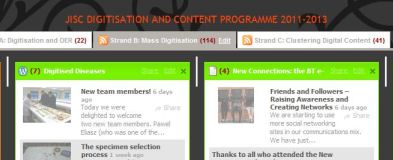You can now keep up with the progress of the projects funded as part of the JISC Content programme 2011-2013 on the programme’s new Netvibes pages.
Netvibes syndicates content from the projects’ blogs and brings them all in one place, so it makes it easier to have a general overview of activities.
My top picks:
– Manufacturing pasts‘ recent posts about how to create engaging learning resources. This project in Strand A: Digitisation and Open Educational Resources is digitising and creating OER around British industrial history during the second half of the twentieth century;
– reflections on selecting content for digitisation from Digitised Diseases (3D digitisation of diseased bones) in Strand B: Mass digitisation together with the New Connections‘ post on using social networks;
– if you know of digital language resources for Latin, Anglo-Norman French, and Old and Middle English, please let the Manuscripts Online project know. This project is part of Strand C: Clustering Digital Content and will provide access and federated search to a range of written and early printed primary sources for the period 1000 to 1500.
A few more projects are still setting up their blog and these will be added soon to the Netvibes pages.

